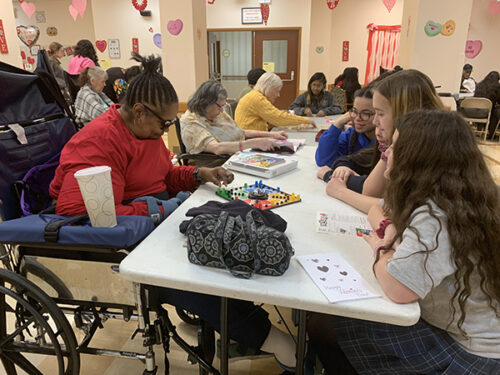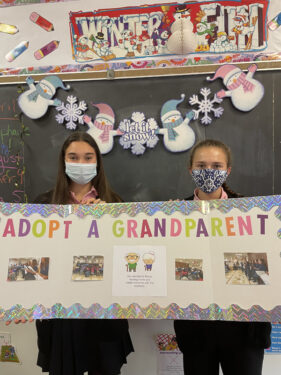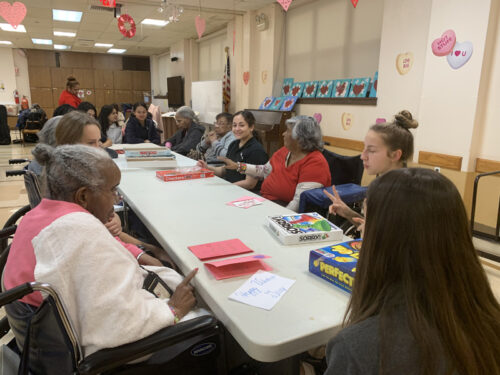
PROSPECT HEIGHTS — The lifting of COVID-19 restrictions in nursing homes in New York is being cheered by residents of Hillside Manor Rehabilitation and Extended Care, a 400-bed facility in Jamaica Estates.
It means the girls of The Mary Louis Academy will be coming back.
Students from the Academy — a girls’ Catholic high school down the street from Hillside Manor — will soon be able to resume their monthly visits to the home. The girls belong to the school’s Adopt-A-Grandparent Club, an intergenerational activity that allows them to meet people one might call “old friends.”
The visits had to be suspended during the pandemic because visitors — not even family members — were permitted inside nursing homes. That changed on Nov. 12 when the New York State Department of Health updated its guidelines for nursing home visits.
No date has been set for the first visit by the Academy students, but Gayle Kirschenbaum, director of recreation at Hillside Manor, said something can be worked out soon.

Mary Hatcher, 84, can’t wait.
“I love talking to young people. It makes me feel young, too, even though I’m so old!” she said. Hatcher, who has lived in Hillside Manor for five years, said she has fond memories of playing board games, singing Karaoke songs, and working on puzzles with the teenage girls, calling those pre-pandemic days “some of the best times of my life.”
During the interim, students stayed in touch with the residents by making gifts that teacher Grace West would deliver to the front desk for distribution. The students knitted scarves, drew handmade cards, and created posters for their friends.
The suspension was particularly painful for West, who created the Adopt-A-Grandparent Club and kept it going for 20 years.
She got the idea to start the club after she lost the last of her grandparents in 2000. “I missed that connection so much,” she recalled.
Expecting a small handful of volunteers to join her, West was astonished when 50 students showed up for that first visit to Hillside Manor. “The residents were so happy to see us,” she said. “Sometimes they don’t get visitors at all.”
Over the years, generations of students have come into the nursing home to forge relationships that transcend age.
Gabriela Maldonado, a senior at Mary Louis, joined the club when she was a freshman. “I was a little worried at first because I wasn’t sure what to expect. But even from the first meeting, we made bracelets for Halloween with the grandparents, and it was really fun,” she said.
Maldonado is currently the club’s co-president with fellow senior Janina Fonseca.
Fonseca remembers one resident who made a strong impression on her. With a keen mind undimmed by advanced age, he told her stories about his life. They also talked about their favorite books. He loved the “Harry Potter” series, for example.
“I felt such a connection — as with a friend or mentor — through him,” she said, recalling that her buddy urged her to learn chess to energize her brain.
“We would meet 104-year old-residents, and the girls were so fascinated by the things they learned from people who had been in World War II and who had lived through a lot of history,” teacher West said. “It was wonderful to see the girls absorb all of this information.”

At first, the students would meet the residents in the community room. But after a while, the girls would also go up and spend time in rooms where frail residents had limited movement.
Kirschenbaum said the residents so loved the visits, “I didn’t have to put it on the calendar. They would tell me when the next visit was scheduled!”
Hatcher cherishes the connections she made. “A couple of the girls wrote me letters. I still have them.”
The advantages of intergenerational relationships have been scientifically documented.
The Harvard University Study of Adult Development, which has been tracking groups of men since 1938. has consistently found that such relationships keep the mind sharp and increase the sense of well-being in older adults.
A 2009 study by Johns Hopkins University found that senior citizens who tutored high school students under an “Experience Corps” program showed remarkable improvements in brain function.
Both sides of every Hillside Manor friendship have tended to benefit.
“Honestly, it’s a real confidence booster,” club co-president Maldonado said. “It helps you practice public speaking skills. And I’ve definitely learned that, when it comes to helping others, a little thing can go a long way.”
